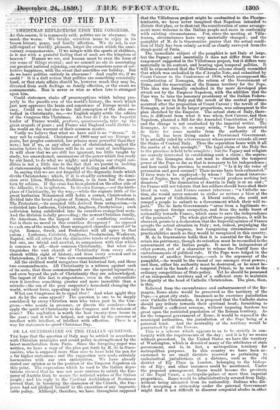TOPICS OF THE DAY.
Could statesmen shake off preconceptions which belong pro- perly to the puerile sera of the world's history, the work which just now oppresses the brain and conscience of Europe would be easy. Could we but rise to the full conception of the idea em- bodied in Christianity, we —we English might settle the affairs of the Congress this Christmas. An Jour de 1' An the Imperial leader of France would, perforce, spontaneously, take up the great crusade of peace ; and France and England could dictate to the world on the warrant of their common master.
Verily we believe that what we have said is no "dream." It may not be realized. Christmas of 1860 may not see Europe at peace, her peoples contented, her princes more powerful than they were ; but if we, or any other state of christendom, neglect the mission before it, the failure will lie in our want of intelligence. It will show that we are still too ignorant, too little taught by study, too unawakened, unconscious of the power which lies ready by our hand, to do what we might; and perhaps our stupid con- dition is not a little due to the fact that we persist in looking at statesmanship without the insight of feeling and affection.
In saying this we are not forgetful of the dogmatic feuds which divide Christendom ; which, if it is steadily extending its domi- nion over Islam, Hinduism, Budhism, is in turn but the more fora by schism. If the cross has been planted on the other side of the Atlantic, it is in splinters. In its own Europe,—not the birth- place of Christianity, by the way,—while the cognate faith of the great barbarian Mohammed still holds a corner, Christendom is divided into the broad regions of Roman Greek, and Protestant. The Protestant,—its accepted title derived from antagonism,—is redivided into Lutheran, Calvinist, Anglican, Presbyterian ; each redivision being subdivided into its countless evangelical sects. And the division is daily proceeding; the newest Christian family, the American, has the largest number of conflicting sections. But is there no moral in this countless divergency ? As opposed to each one of the number, these segregated churches cannot all be right. Roman, Greek, and Protestant will all agree to that axiom ; Lutheran, Calvinist, Anglican, Presbyterian, Wesleyan, Baptist, will all attest that the distinctive tenets of every church, but one, are trivial and unvital, in comparison with that which is common to all,—their common Christianity. But what dis- tinguishes the vast church of Christianity from every other church within sight of history, and from every severed sect in Christendom, if not the "two new commandments ?"
All, the civilized world recognizes that historical fact, and those two commandments. All Christianity is a witness against each of its sects, that those commandments are the special injunction ; and even beyond the pale of Christianity they are acknowledged. The import of this fact is stupendous ; even in the rationalistic view it involves something greater and more incredible than a miracle—the son of the poor carpenter's household changing the world, without force, appealing only to love !
What can Congresses do to equal that ? And what Alight they not do by the same appeal ? The question is one to be deeply considered by every Christian man who takes part in the Con- gress,—who assists in presence, or directs the conclave—how apply the spirit of Christianity to the Congress and its mission of peace ? The cogitation is worth the beat twenty-four hours in the year ; and it will be helped, not spoiled by the converse of intellect with intellect, of intellect with affection. There is a way for statesmen to spend Christmas Day.






























 Previous page
Previous page